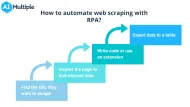RPA Partner: Top 8 Use Cases & Tips on Selecting One in 2024
A Deloitte survey of 400 respondents from different industries showed that 63% wished to use an RPA partner for a successful RPA implementation. An RPA partner is a company that provides expertise and support to organizations wanting to implement and use RPA for automating business processes. Having an RPA partner is important in the implementation process because it provides expertise, skills, experience, scalability, and risk mitigation in terms of time and cost.
In this article, we will explain in more depth what an RPA partner is, its use cases, and give you a list of best practices to follow when navigating the RPA partner ecosystem.
What’s an RPA partner?
RPA (Robotic Process Automation) partner is an entity/individual that works with a company for RPA implementation. Activities include:
- Consulting: Providing guidance, advice, and expertise on RPA implementation. They guide businesses as they identify suitable processes for RPA automation, automate and create implementation roadmap and measurable KPIs.
- Implementation: Developing and deploying RPA solutions.
RPA partners need to be able to provide:
- Technical expertise on RPA software, including software solutions and platforms, and programming languages
- Technical integration capabilities and knowledge of the intelligent automation ecosystem such as artificial intelligence and machine learning capabilities.
An RPA implementation partner may work with companies in a variety of industries, like finance, healthcare, manufacturing, and retail to help increase efficiency, reduce costs, and improve productivity by automating repetitive and time-consuming tasks.
Robotic process automation partner vs. RPA consultant
RPA partner is another name for RPA consultants and these are not well defined terms.
What exactly does an RPA implementation partner do?
Adopters might wonder if they purchase a plug & play RPA solution from a vendor, such as IBM or the UiPath platform, then what role will an RPA partner play. It depends on your company’s needs:
- If your company has the capability and capacity to drive its automation agenda, you may not rely on RPA partners or work with them only on critical initiatives
- If that is not the case, RPA partners can drive your company’s automation journey.
Other use cases of an RPA implementation partner include:
1. Process assessment
Partners can scan your existing processes and identify those that can benefit the most from automation technologies. Especially if your processes heavily rely on legacy apps, the right RPA implementation partner will identify the most suitable automation opportunities.
Learn more about processes ripe for automation.
2. Integration with other systems
If your business relies on multiple systems each with a unique user interface and capabilities, it’d be hard to integrate them together and leverage an RPA on top. RPA partners can create customized APIs, or offer RPA solutions that have in-built API, for easy integration with other artificial intelligence and machine learning technologies.

RPA and API are often confused with each other. Explore the differences between RPA and API in more detail.
3. Testing and validating the RPA solutions
A focus area of technology partners is testing and validating that the automated technology they are helping their clients implement is functional before the pilot is live. You can fulfill your automation ROI requirements quicker if the details are ironed out beforehand.
4. Cost reduction
Technology partners have business analysts that create cost-benefit analysis for the business process that’ll be automated. Moreover, by having knowledge of the RPA market ecosystem, they can recommend vendors that can automate your processes most economically. Lastly, because these organizations have experience in developing and taking a platform live quickly and efficiently, you can reach your digital transformation goals faster and avoid opportunity costs.
5. Training and support
Using a process automation software platform is a long-term investment. And your automation success relies on your employees having the ability and skills for using and managing the tools at their disposal. RPA partners can provide training, technical support, and troubleshooting to organizations. They can also help you set up an RPA center of excellence.

6. Scalability and flexibility
RPA partners ensure your adopted solution is
- Scalable and flexible
- Capable of handling increasing volumes of data and transactions
- Adapting to changing business needs
For instance, the coronavirus pandemic pushed many businesses online. If a business needed the ability to suddenly migrate their processes online, the partner could have deployed and configured the cloud environment.
7. Compliance and risk mitigation
RPA projects should meet legal compliance metrics to avoid legal and financial consequences. For example, RPA bots may access and process sensitive data, such as personal information. Data privacy laws, such as the GDPR of the European Union, say these data should be protected.
The RPA implementation partner can conduct regular compliance tests to identify the relevant data protection regulations and standards that the client must adhere to. This assessment can help determine the gaps in compliance and recommend actions to ensure compliance.
Learn more about compliance automation.
8. Workflow monitoring
Technology partners will continuously monitor the performance of the RPA technology to assess if it’s in-line with the realistic expectations of the organizations. They may use analytics and other tools to measure performance and identify areas for improvement or new intelligent automation and opportunities. For instance, the automation strategy might dictate more use of intelligent automation in various areas. The partner will ensure that their clients’ RPA journey is meeting their expectations.
Best practices when choosing an RPA partner for a successful RPA implementation
Choosing the right Robotic Process Automation (RPA) partner is a critical decision that can make or break the success of your business processes automation initiatives. Here are some best practices for selecting the right partner:
- Assess their expertise: Your partner should have a track record of successfully helping other companies in your industry through their automation journey. You can explore the customer references on their websites to see if they meet this criteria.
- Evaluate their technology: Ensure that the RPA tools your implementation partner provides aligns with your goals and objectives. They should provide a detailed roadmap for integrating RPA into your existing workflows.
- Check their scalability: As your company grows, so will your automation needs. You should pick a partner that has the necessary infrastructure and resources to support your expanding business operations.
- Verify their support and maintenance: Ensure the partner provides robust support and maintenance services. They should offer timely and responsive support and have a dedicated team of professionals to troubleshoot any issues.
- Look for flexibility and agility: The partner should be agile and adaptable to accommodate your changing business needs. They should be able to modify their approach based on your feedback and make changes as required.
- Check their security and compliance: Make sure your RPA implementation partner follows industry-standard security and compliance practices. They should have the appropriate certifications and adhere to data protection regulations such as GDPR and CCPA.
- Evaluate their pricing model: Choose a partner that provides transparent pricing and does not charge hidden fees. They should offer flexible pricing models that align with your budget and business requirements.
- Check their supported regions: The RPA partner ecosystem provides you with different choices, but not all of them offer international services. Pick a partner that offers services in your region. For instance, your company might be in Latin America. You should make sure your region is supported.
By following these best practices, you can find the right RPA partner for your organization’s digital transformation needs.
List of RPA partners
The following list includes some of the partners that global RPA vendors work with to assist robotic process automation adopters to integrate robotic process automation into their workflows. Note that the list of partners aren’t exhaustive. Visit our list of the top 53 RPA tools to see each vendor’s partners.
- Automation Anywhere: Infosys, IBM, Deloitte, Wipro, and TCS
- Blue Prism: EY, Accenture, Capgemini, Deloitte, and IBM
- IBM: IBM as well as other major system integrators and consultants
- Microsoft Power Automate: Accenture, EY, and PwC
- UiPath: Accenture, Deloitte, PwC, Capgemini, and Cognizant
- WorkFusion: Accenture, Deloitte, Cognizant, and Wipro
For more on RPA
To explore RPA in more depth, read:
- RPA Testing: What It Is, Importance, & Best Practices
- 7 Steps to Select the Best RPA Tool & Vendor
- RPA Pricing: Comparison of Leading RPA Vendors’ Fees
Download our RPA whitepaper to learn more about RPA in general:
If you are working for an RPA partner and want an in-depth guide on picking an RPA technology, download our whitepaper on the topic:
And if you’re ready to invest in an RPA solution, head over to our data-driven list of RPA vendors.
We can help you in the selection journey:

Cem has been the principal analyst at AIMultiple since 2017. AIMultiple informs hundreds of thousands of businesses (as per similarWeb) including 60% of Fortune 500 every month.
Cem's work has been cited by leading global publications including Business Insider, Forbes, Washington Post, global firms like Deloitte, HPE, NGOs like World Economic Forum and supranational organizations like European Commission. You can see more reputable companies and media that referenced AIMultiple.
Throughout his career, Cem served as a tech consultant, tech buyer and tech entrepreneur. He advised businesses on their enterprise software, automation, cloud, AI / ML and other technology related decisions at McKinsey & Company and Altman Solon for more than a decade. He also published a McKinsey report on digitalization.
He led technology strategy and procurement of a telco while reporting to the CEO. He has also led commercial growth of deep tech company Hypatos that reached a 7 digit annual recurring revenue and a 9 digit valuation from 0 within 2 years. Cem's work in Hypatos was covered by leading technology publications like TechCrunch and Business Insider.
Cem regularly speaks at international technology conferences. He graduated from Bogazici University as a computer engineer and holds an MBA from Columbia Business School.
To stay up-to-date on B2B tech & accelerate your enterprise:
Follow on

Comments
Your email address will not be published. All fields are required.